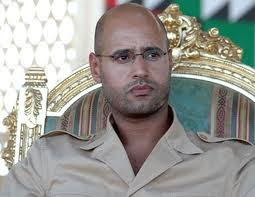
Libyan leader Muammar Gaddafi was brought in from the cold as his second son positioned himself as an agent of reform.
Omar Ashour
(lecturer in Middle East politics and Director of the Middle East Graduate Studies Program at the Institute of Arab and Islamic Studies, University of Exeter.)
Al-Jazeera
"....
Defending the status quo
When I visited Tripoli in March 2010 for a "national reconciliation conference", the conflicting statements given by Saif al-Islam and security officials surprised me. The head of Internal Security Forces, Colonel al-Tuhami Khaled, another principal suspect in the crimes currently being committed against Libyans, refused to call the process a "reconciliation". For him, it was "repentance from heresy".
Given the recent wave of uprisings, it is more evident than ever that any "reform" initiatives undertaken in the Arab world previously were aimed only at sustaining repressive dictatorships and escaping punishment for criminal abuse of power. The reform "debate" within these regimes boiled down to a struggle between different branches of the security-military apparatus over the best way to preserve the status quo.
Arabs, of course, have known for years that their rulers were beyond reform. That is why, in order to have a chance to catch up with the rest of the free, developed world, many of them are now risking their lives to remove those regimes. What is happening today in the Arab world is history in the making, written in the blood, sweat, and tears of the victims of decades of violent repression.
When asked by a journalist what I would like to say to Saif al-Islam if I were ever to meet him again, I replied: "I hope to see you in the International Criminal Court, beside Mubarak and Ben Ali." Millions of Arabs of my generation and younger would probably give the same answer if asked what should become of the men who controlled their present - and sought to destroy their future."
Omar Ashour
(lecturer in Middle East politics and Director of the Middle East Graduate Studies Program at the Institute of Arab and Islamic Studies, University of Exeter.)
Al-Jazeera
"....
Defending the status quo
When I visited Tripoli in March 2010 for a "national reconciliation conference", the conflicting statements given by Saif al-Islam and security officials surprised me. The head of Internal Security Forces, Colonel al-Tuhami Khaled, another principal suspect in the crimes currently being committed against Libyans, refused to call the process a "reconciliation". For him, it was "repentance from heresy".
Given the recent wave of uprisings, it is more evident than ever that any "reform" initiatives undertaken in the Arab world previously were aimed only at sustaining repressive dictatorships and escaping punishment for criminal abuse of power. The reform "debate" within these regimes boiled down to a struggle between different branches of the security-military apparatus over the best way to preserve the status quo.
Arabs, of course, have known for years that their rulers were beyond reform. That is why, in order to have a chance to catch up with the rest of the free, developed world, many of them are now risking their lives to remove those regimes. What is happening today in the Arab world is history in the making, written in the blood, sweat, and tears of the victims of decades of violent repression.
When asked by a journalist what I would like to say to Saif al-Islam if I were ever to meet him again, I replied: "I hope to see you in the International Criminal Court, beside Mubarak and Ben Ali." Millions of Arabs of my generation and younger would probably give the same answer if asked what should become of the men who controlled their present - and sought to destroy their future."

No comments:
Post a Comment